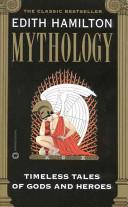“The mind knows only what lies near the heart.”
Source: Mythology: Timeless Tales of Gods and Heroes
Edith Hamilton was an American educator and internationally known author who was one of the most renowned classicists of her era in the United States. A graduate of Bryn Mawr College, she also studied in Germany at the University of Leipzig and the University of Munich. Hamilton began her career as an educator and head of the Bryn Mawr School, a private college preparatory school for girls in Baltimore, Maryland; however, Hamilton is best known for her essays and best-selling books on ancient Greek and Roman civilizations.
Hamilton's second career as an author began after her retirement from Bryn Mawr School in 1922. She was sixty-two years old when her first book, The Greek Way, was published in 1930. It was an immediate success and a featured selection by the Book-of-the-Month Club in 1957. Hamilton's other notable works include The Roman Way , The Prophets of Israel , Mythology , and The Echo of Greece .
Critics have acclaimed Hamilton's books for their lively interpretations of ancient cultures, and she is described as the classical scholar who "brought into clear and brilliant focus the Golden Age of Greek life and thought ... with Homeric power and simplicity in her style of writing". Her works are said to influence modern lives through a "realization of the refuge and strength in the past" to those "in the troubled present." Hamilton's younger sister was Alice Hamilton, an expert in industrial toxicology and the first woman appointed to the faculty of Harvard University.
Wikipedia

“The mind knows only what lies near the heart.”
Source: Mythology: Timeless Tales of Gods and Heroes
“Love cannot live where there is no trust.”
Source: Mythology: Timeless Tales of Gods and Heroes
“Theories that go counter to the facts of human nature are foredoomed.”
Source: The Roman Way (1932), Ch. 1
Referring to Aeschylus in The Great Age of Greek Literature (1942)
Source: The Roman Way (1932), Ch. 10
Saturday Evening Post (27 September 1958); also in Adventures of the Mind : From the Saturday Evening Post (1962), by Richard Thruelsen and John Kobler
Context: It has always seemed strange to me that in our endless discussions about education so little stress is laid on the pleasure of becoming an educated person, the enormous interest it adds to life. To be able to be caught up into the world of thought — that is to be educated.
The Echo of Greece (1957)
Context: What the people wanted was a government which would provide a comfortable life for them, and with this as the foremost object ideas of freedom and self-reliance and service to the community were obscured to the point of disappearing. Athens was more and more looked on as a co-operative business, possessed of great wealth, in which all citizens had a right to share... Athens had reached the point of rejecting independence, and the freedom she now wanted was freedom from responsibility. There could be only one result... If men insisted on being free from the burden of a life that was self-dependent and also responsible for the common good, they would cease to be free at all. Responsibility was the price every man must pay for freedom. It was to be had on no other terms.
On the Greeks, in Ch. 1
The Greek Way (1930)
"The Rediscovery of Christ," Witness to the Truth: Christ and His Interpreters (1962)
Three Greek Plays, introduction (1937)
Context: There are few efforts more conducive to humility than that of the translator trying to communicate an incommunicable beauty. Yet, unless we do try, something unique and never surpassed will cease to exist, except in the libraries of a few inquisitive book lovers.
Source: Mythology: Timeless Tales of Gods and Heroes
“All things are at odds when God lets a thinker loose on this planet.”
Source: The Greek Way (1930), Ch. 1
Source: The Greek Way (1930), Ch. 11
Source: The Echo of Greece (1957), Chapter 4, "The School Teachers"
Source: Mythology: Timeless Tales of Gods and Heroes (1942), Ch. 11
“All things are to be examined and called into question. There are no limits set to thought.”
Source: The Greek Way (1930), Ch. 1
Introduction
The Echo of Greece (1957)
